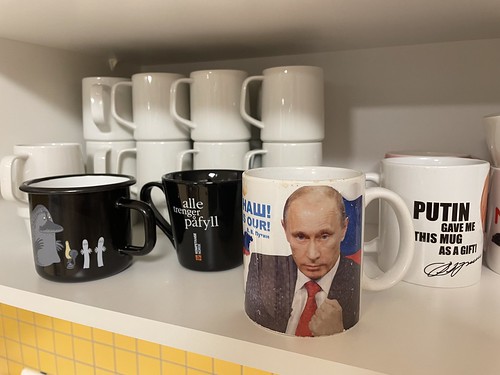Putin says release of US journalist Evan Gershkovich may be possible
Putin #Putin

Vladimir Putin has said he believes “an agreement can be reached” to free the imprisoned US journalist Evan Gershkovich, hinting he would trade him for a Russian killer serving a life sentence in Germany.
Speaking on Thursday to Tucker Carlson, the former Fox News host, Putin said he did not rule out the possibility of Gershkovich returning “to his motherland”.
“But we have to come to an agreement,” he added.
The 32-year-old Wall Street journalist has been held in a notorious Moscow prison for nearly a year after being arrested on espionage charges, which he, his paper and the US government vehemently deny.
When urged by Carlson to release Gershkovich, Putin suggested he might be willing to trade the reporter for Vadim Krasikov, although he did not mention him by name. The Russian suspected FSB agent is serving life in prison in Germany for the murder of a Chechen former separatist fighter in Berlin’s Tiergarten in 2019.
It was the clearest indication to date that Russia was hoping to involve Gershkovich in a prisoner exchange.
The Wall Street Journal said late on Thursday: “Evan is a journalist, and journalism is not a crime. Any portrayal to the contrary is total fiction. Evan was unjustly arrested and has been wrongfully detained by Russia for nearly a year for doing his job, and we continue to demand his immediate release.
“We’re encouraged to see Russia’s desire for a deal that brings Evan home, and we hope this will lead to his rapid release and return to his family and our newsroom.”
Despite promising to only take “30 seconds or one minute”, Putin started his two-hour interview with Carlson in the Kremlin with a 30-minute history monologue that took viewers from the ninth-century rule of Oleg the Wise, to the struggles of the 1300s, through to a critique of Lenin’s foreign policy.
The opening speech ultimately centred on the false narrative that Ukraine’s statehood is a fiction. Putin then proceeded to repeat his justifications for invading Ukraine, claiming Russia’s goal was to actually “stop the war” and that Moscow could not be defeated on the battlefield.
For the first time, however, the Russian leader gave credence to recent media reports that claimed he was sending signals, via intermediates, to the US that he was open to peace talks and that he saw the war ending not with a military victory, but through an agreement with the west.
“We have contacts through various agencies,” Putin said when asked about his communication with the Biden administration over peace in Ukraine. “Certain contacts are being maintained,” he added, without elaborating.
Tatiana Stanovaya, the founder of the political analysis firm R.Politik, said Putin’s strategic goal appeared to be to achieve a peace deal that would cement control of the land Moscow has captured since invading almost two years ago – about a fifth of Ukraine – and to install a Russia-friendly government in Kyiv.
To achieve these aims, Stanovaya said, Putin believed the US must put pressure on Kyiv to hold negotiations to end the war.
“Putin thinks that this is a window of opportunity when Russia has a chance of turning the situation with the war in Ukraine in its favour … against this backdrop, he needs access to western audiences,” Stanovaya said.
Shifting the blame on to the west for the continuing fighting, Putin also claimed the former UK prime minister, Boris Johnson, prolonged the conflict by sabotaging peace negotiations between Kyiv and Moscow in spring 2022.
Johnson, in an interview with the Times, described Putin’s accusations as “total nonsense” and “Russian propaganda”.
There are growing concerns among European nations that Putin could invade a Nato nation over the coming decade, at a time when US support for the continent appears to be dwindling.
Putin emphasised to Carlson that Moscow had no intention of attacking countries on Nato’s eastern flank, a promise that will hardly stem concerns in the west given how Moscow previously played down warnings it was planning to invade Ukraine.
“We have no interest in Poland, Latvia or anywhere else,” Putin said. “It’s just threat-mongering.”
The interview was preceded by days of intense Russian coverage of Carlson’s travels in Moscow, with local reporters covering his every move, down to what he ordered at Tasty and That’s It, the former McDonald’s.
The coverage highlighted Moscow’s desire to show its own people that, in Carlson, Moscow still had powerful allies in the west who were sympathetic to its plight.
Carlson’s visit offered Putin a rare opportunity to present his distorted version of the war in Ukraine to a large US audience at a time when many in Russia, including leading conservative officials, believe Washington is spending too much on aid for Ukraine.
Having been consistent in his pro-Moscow and anti-Kyiv rhetoric, Carlson presented himself as the perfect vehicle for Putin’s plea to the US to halt military aid to Ukraine.
Instead of pressing Putin on the many topics at hand, including credible accusations of Russian war crimes in Ukraine and the continuing imprisonment of the Russian opposition leader Alexei Navalny, the conservative TV host mostly allowed the Russian leader to speak uninterrupted.